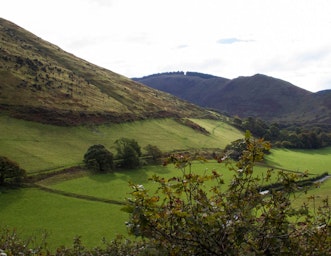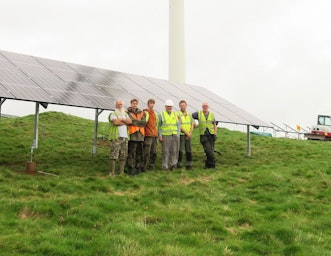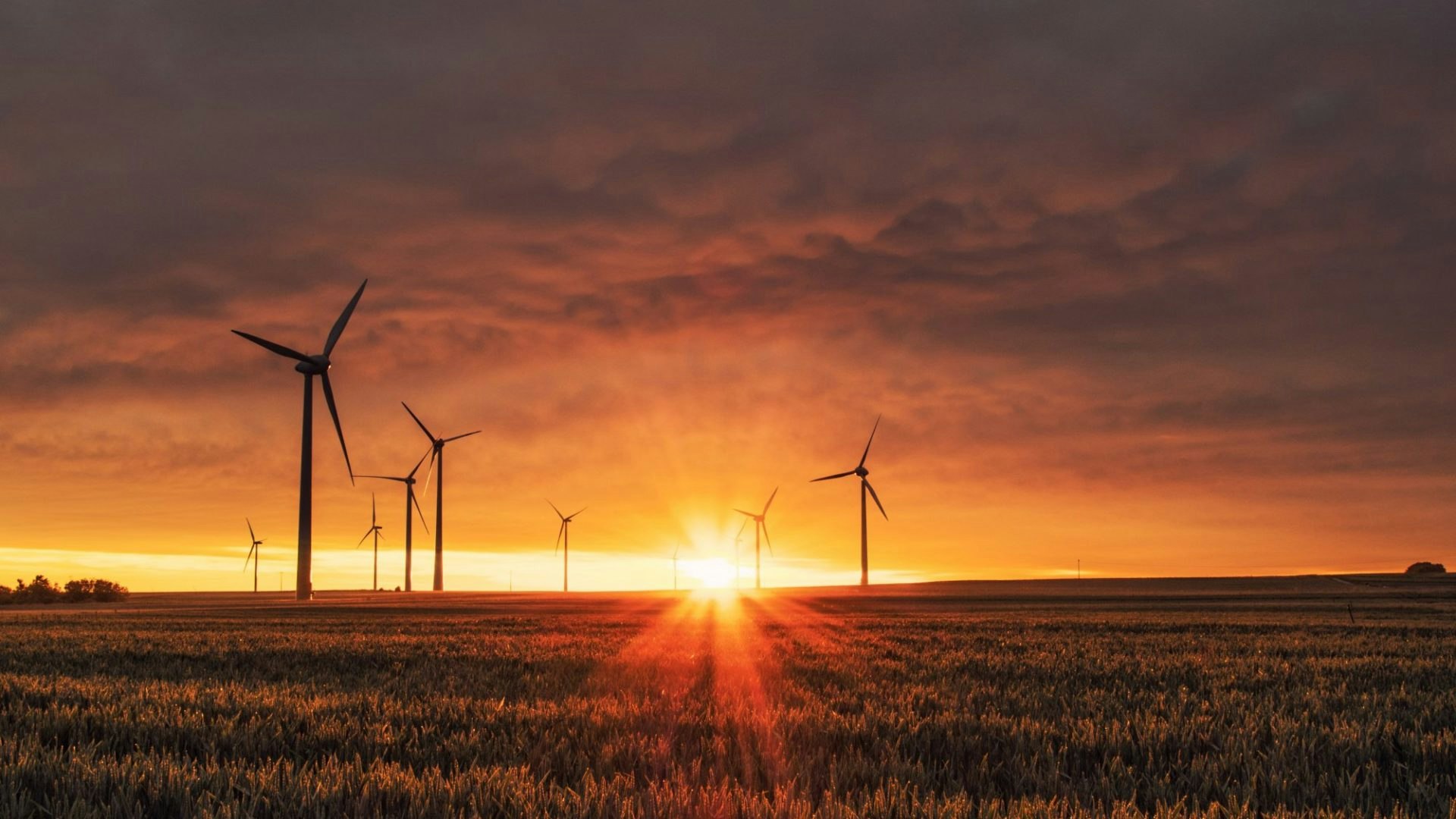
Communities together in a time of crisis: lessons for climate justice
April 23, 2020Home » Communities together in a time of crisis: lessons for climate justice
This week marks the 50th anniversary of Earth Day, with people around the globe coming together online to explore what a post-COVID-19 world could look like. Sarah Jenkinson finds hope in the extraordinary community response, and argues that a just transition to zero carbon must be at the heart of the global recovery.
We are in a traumatic moment in the history of humanity, and yet people are rising to the challenge of a global pandemic with love, compassion and hope.
From my terraced house in a small village near Machynlleth, I can see the rainbow and the words “Diolch NHS” my neighbour’s children have painted onto a white bed sheet blowing in the bizarrely balmy spring breeze. Our local facebook group has just pinged with an immediate response to someone seeking help with picking up a prescription from the chemist in town, a family pack of seeds with artwork from children living over the river are making their way to me, and I feel safe knowing that the volunteers in our community shop will shortly deliver my food order onto my doorstep.
Our community is clearly able to pull together and look after each other in a crisis. This is a huge relief to me, and it seems to be happening in many places across the UK. Doctors and nurses have come out of retirement to help the health service, businesses are building ventilators and people are organising locally to support their elderly neighbours. Kindness has gone viral in our ‘new normal’ and there is a sense of social solidarity. In the face of the anxiety and sadness that COVID-19 has brought to us all, this sense of community feels good.
Inequality of impacts
Like the climate emergency, COVID-19 is a global phenomenon that affects everyone and knows no borders. And whilst it is true that COVID-19 does affect us all, what feels less good is that it is the most vulnerable who are the most affected.
For instance: people who are isolated; people in cramped housing or no housing at all; families unable to afford food or to pay the rent; people with underlying health conditions; key workers (in particular those from ethnic minority groups); people with existing disabilities and care needs; and people around the world with poor sanitation or struggling healthcare systems. Like climate change, it is the poorest and most marginalised communities who are more at risk and suffering the most.
The fundamental flaws and injustices in our economic system are being highlighted by this devastating virus. Inequality has risen, wages have stagnated and job insecurity is so rife that many millions now find their livelihoods thrown into chaos. Meanwhile the World Food Programme has issued stark warnings that the pandemic risks causing a famine ‘of biblical proportions’, with countries already affected by conflict, economic crisis and climate change at the greatest risk.
The world we want
Here in the UK, the Government has abandoned austerity measures, and instead is socialising the economy by putting cash into some bank accounts of households and businesses. But what will happen to support the recovery in the long term, in the UK and on a global scale?
Climate change is a very foreseeable risk that will unfold over decades to come, and we must make sure we are prepared and take bold action to build our resilience. The next decade will determine what kind of a world we create.
Sir David King, who was chief scientific adviser from 2000 to 2008 and served as special representative for climate change to the UK government, has pointed to the economic recovery plans after the second world war, and said that after the coronavirus crisis has passed, governments should consider similar plans to redevelop the global economy to adjust to a fossil fuel-free world.
Investing in a better future
Here at the Zero Carbon Britain Hub at CAT, we want to see a stimulus package that delivers both a more equal, inclusive, sustainable economy, and a fast zero carbon transition, to ensure the UK is far more resilient to pandemics, climate change and other interconnected global challenges.
Leading scientists have already clearly stated that UK Government responses to climate breakdown and to the challenges of poverty and inequality must be changed permanently after the coronavirus has been dealt with. The trick is to identify synergies between investments for the changes needed to reach net zero. We need investments to improve health and wellbeing, enhance biodiversity, restore jobs, reduce poverty, and increase our resilience and ability to adapt to rising global temperatures and other challenges already in the system.
Planning the transition
Here in lockdown, the A487 trunk road outside my home is silent for the first time since it heavily snowed the winter of 2010/11. The air is free of diesel fumes, my asthma is much improved and my emotional wellbeing is soothed by the sound of bird song and children’s voices, as they reclaim the street to cycle with their parents. In this still, and strange, new reality, I find comfort in the unity and positivity around me. To stay upbeat, do take a look at our community shop in Treddol or Machynlleth’s food resilience group, Plant Food! Share your stories with us too on facebook and twitter.
The next crisis – the climate crisis – is emerging and avoidable. Climate justice for the world’s poorest people is achievable. Investing in people, nature and zero carbon development is doable. We’ve seen that sudden forced transformations are possible. We are experiencing what communities are capable of doing together, and how nature can recover. With repeated disruptions to societies, comes the opportunity for learning, growth and radical change. We have watched the inequalities of this pandemic unfold, and we have shared stories about community resilience.
The fact that we have actually experienced change, means that we realise what needs to be done, and that change is possible. Together, we must look to the courage and compassion in our communities, and gather the skills we need to re-build a resilient and fair zero carbon world.
Sarah Jenkinson is CAT’s Head of Policy and Communications
- Zero Carbon Britain
- Climate Change
- News Feed
Related Topics
Related news



CAT Conversations: Sandy Stevens, CAT graduate
17th April 2025
More solar energy for CAT
4th April 2025
Zero Carbon Britain: live on
Next available dates: 20 to 21 May 2020
Enews sign up
Learn more about the latest news, events and activities from CAT by signing up to our Enews and following us on social media.
